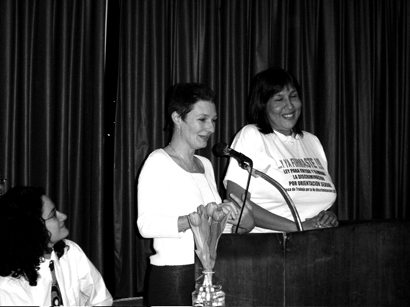At the U.N., feminist organizers discuss a worldwide problem
On March 9, a panel of human rights activists discussed the problem of lesbian-baiting in conjunction with the issuance of a report that analyzed the way in which women’s sexuality is used to block their social and economic equality in nations around the world.
Paula Ettelbrick, executive director of the International Gay and Lesbian Human Rights Commission (IGLHRC), and Susana T. Fried, program director of the Center for Women’s Global Leadership, spoke about the report, “Written Out: How Sexuality is Used to Attack Women’s Organizing,” along with activists from Namibia, Argentina, Turkey and Uganda.
The document is an annual update of a United Nations publication that focuses on women.
“Written Out” offers an analysis of the roadblocks that women face in achieving parity with their male counterparts. Typically, according to panelists, women organizers who strive to redress social inequities are labeled as lesbians in an effort to demean their credibility. In many parts of the world, religious fundamentalism and homophobia can make these allegations very dangerous both to a female advocate’s safety and to her effectiveness as an activist.
The prevalence of such biases explains why many human rights organizations are reluctant to discuss gay issues.
“The report captures a range of women’s experiences that show that lesbian-baiting is part of sexuality-baiting,” said its author, Cynthia Rothschild, who interviewed 60 women on her work. “Depending on your culture and region, allegations might have to do with if you’re childless, unmarried, not a good woman—it pertains to what’s most cutting in any particular place.” Rothschild told of a lesbian conference in Costa Rica in 1990 in which the government asked consulates to deny visas to women “of a certain appearance,” meaning those who appeared to be lesbians or women traveling alone. The Costa Rican government also threatened airlines, telling them to turn back women who would fly into the country for the conference.
“How dangerous women’s political agendas seem,” said Rothschild, who noted that the report marked the first time the connection had been made between what she calls a “global phenomenon” of using lesbian-baiting to silence women’s voices.
In Thailand, Rothschild reported, women leaders of a non-governmental organization received sexually harassing phone calls after the group spoke out against a gas pipeline project. In a bizarre turn of events captured on video during a public demonstration, police assaulted one female speaker, ripping off her clothing. Later, altered video footage of the event aired, explaining the women’s condition with the claim that, “women were tearing off their bras in order to be on TV!”
Such repressive tactics not only occur in the developing world, but in the United States as well, said the panelists. In October 2003, former National Organization for Women Pres. Patricia Ireland was asked by the board of directors to resign as director of the YMCA after the conservative Traditional Values Coalition urged the group “to protect girls from Ireland’s radical, bisexual, cross-dressing and pro-abortion agenda.”
Speaker Sarah Mukasa from Uganda told of how her group Akina Mama Wa Africa staged a production of “The Vagina Monologues” only to have the government shut it down.
Not only was the event in Uganda closed down, said Ettelbrick, but it caused allegations of everything from a corrupting Western influence to a theory that the women were all lesbians, and that’s why they were challenging men.
“Even in a recent New York Times piece about Condoleezza Rice, they referred to her as ‘the woman in red.’ They would never do that with men… and it is used to distract from the seriousness of our work,” added Ettelbrick.
Strategies were discussed for countering lesbian-baiting. Fried noted that Elizabeth Khaxas, a panelist from Sister Namibia, a feminist group in Africa, said her group has always given visibility to lesbian issues, and has resisted baiting by working to build broad coalitions with other Namibian human rights organizations.
“When Sister Namibia comes under attack, those organizations are right there to defend their work, to defend speaking openly about sexuality as a human rights issue, or to take to the streets, which has actually happened,” said Fried, who served as the panel moderator.
Fried also lauded the strategy shared by Lohana Berkins, a transgendered activist from Alitti, an Argentinean group. She was particularly impressed by how Burkina tied sexual rights to migrant rights, housing, nutrition and other social justice issues.
“It’s not just about coalition building, but about understanding how those are all integrally linked,” said Fried. “[Berkins] uses herself as an example, saying, ‘Yes I’m trans, but I’m also a feminist, a large woman, indigenous, all of these things.’ So she articulates it by talking about herself, and links it to political strategies she’s used.”
gaycitynews.com


































